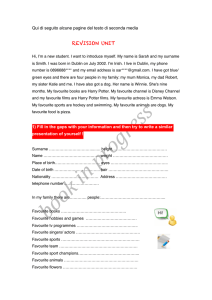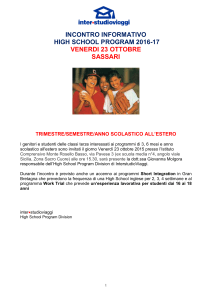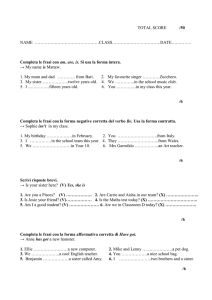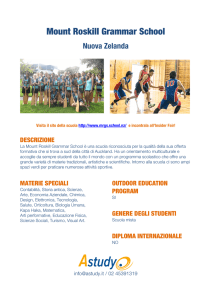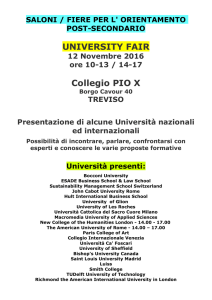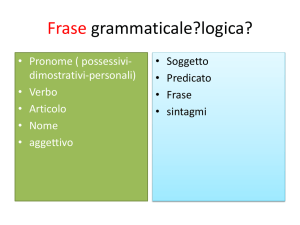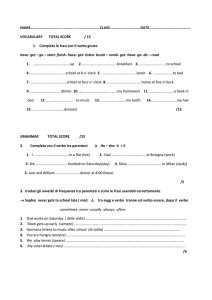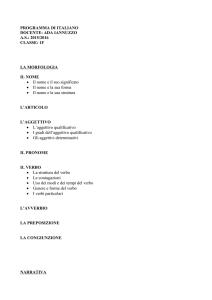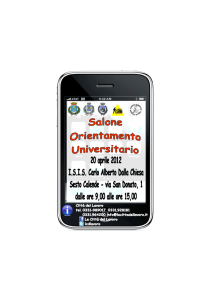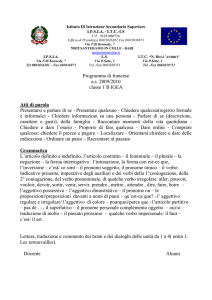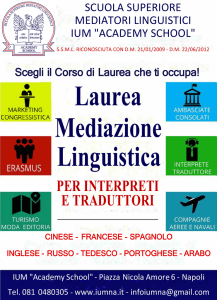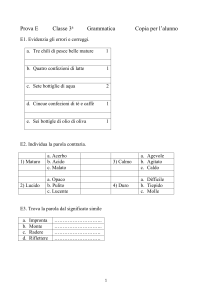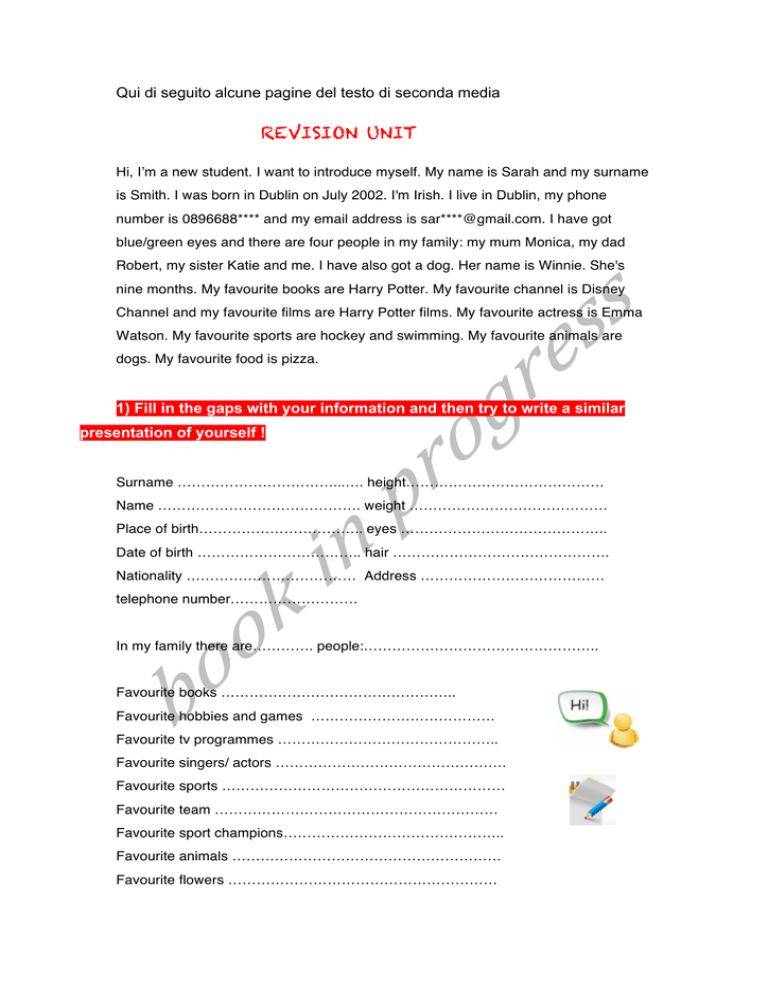
Qui di seguito alcune pagine del testo di seconda media
REVISION UNIT
Hi, I’m a new student. I want to introduce myself. My name is Sarah and my surname
is Smith. I was born in Dublin on July 2002. I'm Irish. I live in Dublin, my phone
number is 0896688**** and my email address is sar****@gmail.com. I have got
blue/green eyes and there are four people in my family: my mum Monica, my dad
Robert, my sister Katie and me. I have also got a dog. Her name is Winnie. She's
nine months. My favourite books are Harry Potter. My favourite channel is Disney
Channel and my favourite films are Harry Potter films. My favourite actress is Emma
Watson. My favourite sports are hockey and swimming. My favourite animals are
dogs. My favourite food is pizza.
1) Fill in the gaps with your information and then try to write a similar
presentation of yourself !
Surname ……………………………...…. height……………………………………
Name ……………………………………. weight ……………………………………
Place of birth…………………………….. eyes ……………………………………..
Date of birth …………………………….. hair ……………………………………….
Nationality ……………………………… Address …………………………………
telephone number………………………
In my family there are…………. people:…………………………………………..
Favourite books …………………………………………..
Favourite hobbies and games …………………………………
Favourite tv programmes ………………………………………..
Favourite singers/ actors ………………………………………….
Favourite sports ……………………………………………………
Favourite team ……………………………………………………
Favourite sport champions………………………………………..
Favourite animals …………………………………………………
Favourite flowers …………………………………………………
Favourite colours…………………………………………………
Favourite food ……………………………………………………..
Favourite clothes…………………………………………………
Favourite subject ……………………………………………….
Other …………………………………………………………….
I usually spend my free time with:
__ my friends
etc)
__ my family ( parents, brothers or sisters, cousins, grandparents,
__other adults
__my school friends __alone
During my free time I usually
•
read books, comics or magazines………………………….
•
play videogames or computer games ………………………
•
do a sport ………….
•
watch the television.
•
listen to music ……………….
•
use social networks
•
go out with friends __ surf the net __ draw or paint __ play an instrument __ go
to the cinema __ play outside
Other: _____________
I usually watch television:
__ less than an hour a day.
__ from two to three hours a day
__from 1 to 2 hours a day __ for more than 3 hours a day
__ with my friends
__ with my family
__alone
2) List three things you can do well and three that you can't do but that
you would like to learn
I can ……………………………, ……………………………………..and
…………………………………. I can't ……………………………….,
……………………………………
My presentation (prima di farla correggere all'insegnante prova a confrontarti con
un/a compagno/a per vedere se ricordate l'uso delle funzioni studiate l'anno scorso e
guarda la tabella in basso)
Hi! My name is...
Remember
Verbs
Functions
Present Simple Be
-am
-is
-are
Personal info: name, age, address,
favourite, ecc…..
My……… is………..
I’m tall
These are……….people in my
family
Possessions / family / physical
description……..
I have got……….. hair /eyes
Present simple Have
Have got
Have got
Has got
Can
Can
Present simple
I watch TV
He watch-es TV
Present continuous
-am playING
-is playING
-are playING
Abilities………..
I can play football…….
Habits / routine / free time
activities…
I watch TV with my brother
In my free time I usually read
comics or surf the internet
Actions of this moment
I am playing football now
3) Complete the following sentences using “to be” verb
1) They ………..at home tonight.
2) You …… a good teacher.
3) She ………..not a painter.
4) They …………students.
5) I………. not Spanish.
6) These exercises ………. very difficult.
4) Turn into plural the following sentences
1) She is Paul’s teacher.
2) He is Marie’s brother.
3) It is Simon’s book.
4) You are Mrs.Brown’s friend.
5) I am Mr.Bean’s aunt.
5) Turn the sentences using possessive adjectives
1) We have got a white cat….. cat is white.
2) They have got a big car……car is big.
3) He has got a nice bedroom……bedroom is nice.
4) I have got a black dog…….dog is black.
5) The school has got a very big gymnasium……..gymnasium is very big.
6) She has got a red bike……..bike is red.
……………………………………………………………………………
UNIT 1
NEW ENTRY
Read and listen carefully to the dialogue
Teacher: Good morning.
Students:Good morning teacher.
Teacher: Today there's a great new.
Students: Oh what's about?
Teacher: I'm introducing you a new pupil.
Students: Oh great.
Teacher: She is English and you can ask her some questions.
Maria: Where are you from?
Helen: I'm from London.
Marco: How old are you?
Helen: I'm 13 years old.
Gianni: Where do you live?
Helen: I live in Bari.
Luca: Do you like ice cream?
Helen: Yes I do.
Gianni: Do you like fish?
Helen: No I don't.
Stefano: And do you like chips?
Heldon: Oh yes very much.
Stefania: Do you like vegetables and meat?
Helen: Well,I hate vegetables but I prefer meat.
Gianna: Mum says vegetables are healthy.
Luca: My mum says chips are unhealthy but I don't like listening to her. I'd like eating
what I prefer, like eating no bread and don't drink any milk.
Marco: Do you like playing the guitar?
Helen: Yes I do.
Antonio: Do you like swimming?
Helen: No I don't. I dislike sea I love mountain.
Fabrizio: When's your birthday?
Helen: It's on 2nd May.
Students: Sorry? What?
Teacher: Ok. I will explain you it. Well, to ask the date you say: "What's the date?"
To answer you say: first the ordinal number and then the month. For
example today is 29th October. Now what day is it today?
Students: Monday.
Teacher: Can you show Helen your school day activities on Monday?
Marisa: First English, then French, after that Geography, History and finally Music
and P.E.
Helen: What are you doing tomorrow?
Tina: Tomorrow we are having Maths, Italian, English, Geography, Religion and
finally History.
Helen: I can't understand Maths if the teacher explains it in Italian.
Teacher: Don't worry, I will explain you the most important Maths symbols. Look to
this list:
Addition= Plus
Ex: 4+7=11 Adding four to seven gives you eleven.
Substraction= Minus
Ex: 9-4=5 Substracting four from nine gives you five.
Multiplication= By
Ex: 5x3=15 Multipling five by three gives you fifteen.
Division= Division sign
Ex: 32:8=4 Dividing thirthy-two by eight gives you four.
Equals= Uguale
Fractions= Frazioni
Even number= Numero pari
Odd number= Numero dispari
To count= Contare
What's the sum?= Qual é la somma
Value= Valore
Average= Media
Remainder= Resto
1) Read the following Math operations
32x4=128;
11-4=7;
10x4=40;
50:5=10
2) Now listen and repeat the following ordinal number
1st;
2nd;
3rd;
4th;
5th;
6th;
7th;
8th;
9th;
10th.
………………………
SPECIAL EDITION OF MASTERCHEF
AT SCHOOL
……………………This year we did a fantastic edition of Masterchef where each of us
made a recipe at home and brought it to school.
There were four judges who tasted and commented on our recipes.
They asked the class a few questions
1.What is the name of your recipe?
2.What are the ingredients?
3.How did you make it?
4.Was it easy or difficult to make?
At the end the judges expressed their opinions:
-The first prize went to Rachel for her chocolate muffins with whipped cream
-The second prize went to Francesca for her fried chicken with yoghurt sauce
-The third prize went to Alessia for her chocolate pudding
Why don’t you try yourn own Masterchef at school? …………………………………………………………
ORECCHIETTE WITH CIME DI RAPE
……………….This is the most well known dish from Bari. “Cime di rape” are known
as “Turnip tops” in English.
Ingredients:
•
400g Orecchiette
•
800g Cime di rape
•
4 Anchovy fillets
•
1 Tablespoon of olive oil
•
1 Clove of garlic
•
1 Dried chilli
Boil the rape in plenty of salted water for 3 or 4 minutes, then add the orecchiette.
Meanwhile fry the anchovies, whole garlic clove and chili in the olive oil. Remove the
garlic and add the cime di rape and orecchiette.
……………………………………………………………………………………. UNIT 2
IN THE PAST
MY FANTASTIC EDUCATIONAL
SUMMER HOLIDAY
…………. Elena is telling to her friends about her educational holiday. Read
and listen carefully to the text
Three years ago, when I was fifteen years old, I was
in Scotland for an educational holiday for two weeks.
In my group there were 35 students and 3 teachers.
On 16th July we were in “Lamezia Terme” airport in
the morning and in Edinburgh in the evening. We
stayed at the Queen Margaret University College in
Edinburgh. It was a big and ancient college, in a quiet
and green area in the north-west of Edinburgh at about 20 minutes from Prince
Street, the most popular and well-known street for shopping.
In the college there was a swimming
pool, tennis courts, football field and a
gym. Near the classrooms there was a
little
shop
where
we
could
find
everything. Next to the main building
there was a Student’s Union.
It was our meeting point and our disco at night.
My group’s accommodation was in a building of three floors. In my flat, at the first
floor, we were only girls, two for each room. There was a shared kitchen but there
wasn’t a living room. The boys weren’t in the same floor. They were on the third floor.
In the morning, from Monday to Friday, there were lessons from 9 to 12 o’clock in the
campus. At lunch-time students and teachers were at the school canteen and in the
afternoon there were sports activities or excursions to the centre of Edinburgh…
……………………..
1) True or False? Correct the false ones
1) Elena’s educational holiday was in London
T
F
2) She was fifteen years old
T
F
3) There were 36 students and four teachers
T
F
4) Elena was in Edinburgh in the evening
T
F
5) The College wasn’t Queen Margaret
T
F
6) There was a swimming pool in the college
T
F
7) There weren’t lessons in the afternoon
T
F
8) There weren’t excursions and sport activities
T
F
2) Answer the questions
1) When was Elena in Scotland?
2) How many students were there?
3) Was the Queen Margaret University a big and ancient College?
4) What was there in the college? Was there a student’s Union?
5) Were there lessons in the afternoon?
………………………………………..
Il Past Simple del verbo be si usa per parlare di un’azione che è iniziata e si
è conclusa
definitivamente nel passato
past simple
I
You
He
She
It
We
you
They
was
were
was
was
was
were
were
were
present simple
happy
happy
happy
happy
happy
happy
happy
happy
I am happy
You are happy
He is happy
She is happy
It is happy
We are happy
You are happy
They are happy
2) Circle the correct alternative
1) She was / were at home yesterday morning.
2) We was / were at the college last year.
3) It was / were in the garden in the morning.
4) My dad was / were at work on Friday.
5) They was / were in London last summer.
6) My friends and I was / were at school from 8,00 to 4,00.
………………………………………………………………………….
13) Invent some exercises with the affirmative, negative and
interrogative form of the verb "be"
......................................................................................................................
......................................................................................................................
......................................................................................................................
......................................................................................................................
......................................................................................................................
......................................................................................................................
……......................................................................................................... …………… Interessante è sapere COME si forma il PASSATO DEI VERBI E’ molto semplice! Ma scopriamolo insieme.
Per farlo, partiamo da un gioco:
the APPLE GAME. Si tratta di un pair work, un gioco che si fa in
coppia.
Troviamo un ambiente spazioso ed accogliente, nel quale ci si possa muovere
comodamente.
Ora seguiamo le istruzioni e cominciamo a giocare:
1) take an apple
2) put the apple on your forehead and try to hold it tbetween you and your
partner
3) listen to the music and start dancing
4) dance and try to hold the apple between the two of you
Riprendiamo ora alcuni dei verbi utilizzati nel gioco; riusciamo a ricordarne i
significati?
Prova a trascrivere accanto ad ogni parola inglese la sua traduzione:
Drop = _ _ _ _ _ _ _ _ _
Clap = _ _ _ _ _ _ _ _ _
Start = _ _ _ _ _ _ _ _ _
Dance =_ _ _ _ _ _ _ _ _
Stop =_ _ _ _ _ _ _ _ _ _
Try =_ _ _ _ _ _ _ _ _ _ _
Stay =_ _ _ _ _ _ _ _ _ _
Listen =_ _ _ _ _ _ _ _ _
PAST SIMPLE
FORMA AFFERMATIVA
Consideriamo per esempio il verbo:
to start che significa INIZIARE. La forma base del verbo è START.
Pertanto, al verbo START aggiungo il suffisso ED
e diventa _ _ _ _ _ _ _.
A questo punto posso provare a coniugare il verbo che rimarrà sempre uguale a se
stesso, in tutte le persone:
I started
You ………..
She ………..
He ………….
It ……………
We ………….
You …………
They ………..
I start
You start
She starts
He starts
It starts
We start
You start
They start
… … … … … … … … … … … … … … … … … … … … ..
3) Complete the crossword with the simple past verbs
1) I….. my face
2) He ….at the traffic light.
3) Yesterday it …..all day long.
4) Jack the Ripper …..a woman.
5) She …..up in a beautiful dress for
the party.
6) They …..History.
Now write the colored word:
………………………………
PAST SIMPLE
VERBI IRREGOLARI
Finora ci siamo occupati della forma del Simple Past dei verbi REGOLARI.
Ma cosa succede con i verbi IRREGOLARI che sono davvero tanti e tanto usati?
I verbi IRREGOLARI, lo dice la parola stessa, NON seguono REGOLE. Sono
SREGOLATI! Questo vuol dire che non ci sono regole che ci permettono di ottenere
la forma del Past Simple di un verbo irregolare partendo dalla sua forma base.
Che fare allora?
BISOGNA IMPARARE I VERBI A MEMORIA, BY HEART, COME DICONO GLI
INGLESI.
Prima di mettere al lavoro le nostre meningi, però, cerchiamo di capire che cosa
dobbiamo imparare a memoria.
E’ chiaro che si tratta di verbi, ma in modo particolare si tratta di imparare il
PARADIGMA DEI VERBI.
Cos’è un paradigma: è quel modello fornito dalla grammatica per la coniugazione
di un verbo nelle sue diverse forme (Dizionario della Lingua Italiana Sabatini
Colletti).
Dunque, se consideriamo per esempio il verbo to be, e il verbo to have i loro
paradigmi sono rappresentati dall'insieme delle tre forme - infinito, passato semplice
e participio passato - posizionate, in genere su tre colonne diverse, come indicato di
seguito:
N.B. si ricorda che il past traduce non solo il tempo imperfetto, come nell’esempio,
ma anche il passato prossimo ed il passato remoto.
…………………………………………………………………………………. ………………….Proviamo ora ad accorpare i verbi irregolari per gruppi di suoni.
Ad ogni gruppo corrisponderà una sequenza di SUONI diversi.
……………………………………………………………………………………….. 3) Use the following groups of words to write sentences in the past simple
1) I / wear / my new T-shirt / yesterday.
2) Jade and Lucy / go / to the cinema / on Sunday.
3) My friend / see / my mum / at the supermarket in the morning.
4) He / do / his English homework / yesterday afternoon.
5) My sister / eat / a pizza with a sausage topping with chips / last weekend.
6) You/ buy / a red shirt and a pair of white shoes / yesterday afternoon.
7) The dog / bite / the cat / under the table / last night.
8) The student / have a coffee / with his teacher / yesterday morning.
9) The wind / blow / vey fast / last night.
10) The school year / begin / in September.
5) Do you remember this picture? Use ita gain now to say what you did
yesterday. If you can, add something more, as in the example given
ex. 1) Yesterday I got up at seven o’clock. It was so early for me.
2) I had a shower.
…………………………………………………………………………….
UNIT 3
HE'S SHORTER THAN HIS NEW FRIENDS
………………..Alexys and Stephanie are meeting at the park.
ALEXYS: Hi Steffy!
STEPHANIE: Hi Alexys! How are you?
ALEXYS: Good! And you? Your brother Adam?
STEPHANIE: Oh, we are fine. It’s a special moment for him, as you know.
ALEXYS: Yeah! What about his new school?
STEPHANIE: Oh, good! It’s bigger than the old one and his classmates are friendlier
than
those of the old school. But there’s a problem!
ALEXYS: What’s going on?
STEPHANIE: (laughing) He’s shorter than his new friends but taller than two persons…
ALEXYS: Oh, I don’t think it’s a really big problem!! Let’s think about the new school:
lessons? Teachers?
STEPHANIE: Well, lessons are more interesting but less long than those of other
school.
ALEXYS: Good! And how does Adam get there?
STEPHANIE: On foot. Luckily this school is as near as the other one. You know, I go to
school by bus because it isn’t as near as his! He should be happy for
everything!
ALEXYS: Well! So, Adam’s school is less bad than he thought!
STEPHANIE: Yes, it is!
1) Answer the questions
1)
Where are Stephanie and Alexys?
………………………………………………………………………
2)
Who’s Adam?
……………………………………………………………………….
3)
Who is attending a new school?
……………………………………………………………………..
4)
Is new school big or small?
……………………………………………………………………………………………
5)
What do new friends look like?
…………………………………………………………………………………………...
6)
Are lessons boring?
…………………………………………………………………………………………..
7)
How does Stephanie get her school?
………………………………………………………………………………………….
Transport
2) Make sentences adding transport
1. everyday / go to school.
…………………………………………………
2. always / go to the park.
…………………………………………………
3. often / travel.
………………………………………………..
4. usually / do the shopping.
………………………………………………
5. never / go the gym.
…………………………………………….
COMPARATIVO DI MAGGIORANZA………………….Osserva bene e poi
completa le regole:
FRIENDLY à
FRIENDLIER
SHORTà
SHORTER
Se l’aggettivo termina con
–y preceduta da
Per formare il
consonante,
comparativo di
si toglie ………….
maggioranza, basta
e si aggiunge…………..
aggiungere il
suffisso …………
all’aggettivo.
CLEVER à CLEVERER
Tutti gli aggettivi di due
sillabe che terminano
BIG à BIGGER
con –ow, -er, -le
Se però
seguono la regola
l’aggettivo termina
generale, ovvero
con una
……………….
consonante
preceduta da una
vocale, si
raddoppia
______________
_______ .
NICE à NICER
Se l’aggettivo
INTERESTING à MORE INTERESTING
Gli aggettivi polisillabi devono essere preceduti
da more.
termina con –e
muta, si aggiunge
solo
____________
Good à better
Bad à worse
Fast à further
N.B.: Come avrai capito è importante tenere presente che tipo di aggettivo si vuole
trasformare: aggettivo breve – aggettivo lungo – aggettivo irregolare.
N.B.: Come avrai capito è importante tenere presente che tipo di aggettivo si vuole
trasformare: aggettivo breve – aggettivo lungo – aggettivo irregolare.
Make these adjectives into comparative form
SMALL
………………………….
FAT
LARGE ………………………….
DANGEROUS ………………………….
EASY
POPULAR…………………….
………………………….
YOUNG …………………………
HAPPY……………………
N.N.B.: Il secondo termine di paragone deve essere introdotto da than
à Turin is LARGER THAN Benevento.
Torino è più grande di Benevento.
Complete using comparative form
My room is ............... (large) ............ yours.
English is ............ (easy) ............ French.
Climbing is ............ (dangerous) ............ cycling.
Mark is ............ (thin) ............ Frank.
………………………………………………………………………
SUPERLATIVE!
Il SUPERLATIVO RELATIVO DI MAGGIORANZA si usa per esprimere una qualità posseduta
al massimo grado relativamente ad un gruppo di persone o cose e,
Ricordi l’esercizio di pagina 5? Riscrivi qui i seguenti aggettivi ricopiandoli nella
forma in cui li hai osservati dal testo:
RICH ……………………….
KIND …………………….. FUNNY ……………………
Cosa noti?
STRANGE ………………..
CRAZY ……………………
.......................................................................
Completa la regola
il
superlativo
relativo
di
maggioranza
si
forma
aggiungendo
all’aggettivo
…………. e lo si fa precedere
dall’articolo ………… .
Come per i comparativi, anche in questo caso è necessario distinguere i tre tipi di
aggettivi: aggettivo breve – aggettivo lungo – aggettivo irregolare.
OLD
à the oldest
GOOD
à the best
IMPORTANT
BAD
à the most important
à the worst
………………………………………………………………….
N.B.: dopo il superlativo, il secondo termine di paragone è introdotto da IN, se si
tratta di un luogo, oppure OF, se si tratta di una categoria, un gruppo di
persone o cose.
I’m the tallest in my class.
Mary is the funniest girl of our group.
Complete using superlative
1. Jenny is …………………… (funny) girl of the class.
2. Po ……………………… (long) river in Italy.
3. Russia is ………………. (big) country in the world.
4. Ferrari is …………………….(expensive) car!
5. Football is ………………… (popular) sport in Italy.
UNIT 4
TOP-FIVE MUST-HAVES FOR TEENAGERS
Top-Five Must-Haves for Teenagers
1)
High-tech gadgets and devices (trendy colourful lightweight smartphones, tablets,
laptops…)
2)
Fashionable school/sports gear (back packs, T-shirt, trainers…)
3)
Latest video games selection
4)
Hair products and accessories (hair straightener, hair spray, clips, nail varnish…)
5) ………………………………………………………………………………
1) Read the text and add one item you think teenagers MUST have to keep up
with the times.
Now make a list of 3 things which are really important to you, because they make
you feel good
………………………………………………………………………
Listen carefully and read
Mon, Jan 5, 2016
California’s
#
1
Teen
Magazine
Teen’s voice magazine
Crazy school rules
Some students talk about the crazy rules in the strictest schools in Britain.
Hi,
My name’s John. I’m 14 and I attend West London Free School. In my school, you
can get a suspension for a too short haircut but also prizes for coming first.
Hi,
My name’s Bea. I’m 15 and I go to Colne Valley Secondary School in Huddersfield.
In my school, you get a one-hour detention if you forget to bring pens, rubbers or
pencil-sharpeners
Hi,
My name’s Rebecca. I, attend the Noble Street College in Chicago. In my school you
have to pay a fine of $ 5.00 (about € 4) if you chew gum in class.
Hi,
My name’s Elizabeth. I’m 14 years old and I go to Dartwood Secondary School. In
my school you can’t put your hair in a pony tail! If you do it, you get a one-day
suspension.
Hi,
My name’s Jack. In my school you mustn’t wear any jewelry or make-up!
Comprehension questions
Who says what? Write the right name!
1) “In my school you can’t chew the gum” ……..............
2) “In my school you can’t wear bracelets or earrings”…………………….
3) “You mustn’t come to school with extreme hairstyle”……………………..
4) “We must bring to school everything we need”……………………………
5) “In my school, students must dress their hair
according to the school rules! ………………………………
………………………………………………
…………….. esprime l’obbligo o il dovere di fare qualcosa
………………è la forma negativa, usata per esprimere proibizione o divieto
Come già per can/ can’t, MUST ha un’unica forma per tutte le persone ed è
seguito dalla forma base del verbo all’infinito.
Come ricorderai, anche il verbo CAN/CAN’T può essere utilizzato per esprimere
permesso o proibizione.
Inserire fumetto (alunni di Anna)
SN.
DX
Can I ..
No, you can’t
Il verbo MUST può essere sostituito da HAVE TO
Read and match each sentence with the corresponding function
1.
2.
3.
4.
Tom can cook very well
You mustn’t talk in library
You must make you bed
Can I go out, Miss?
a. dovere, obbligo
b. capacità di fare qualcosa
c. richiesta di permesso
d. divieto, proibizione
………………………………………………………………
Write 6 rules you have in your school. Use must/mustn't/have to. Think about
behaviour, personal appearance and how to use possessions
Write Behaviour 1. 2. Personal Appearance How to use personal possessions ……………………………………………………………………………………… Asking for and giving
directions
Language for asking for directions
Can you tell me the way to How can I How far is it to Language for giving directions
get to the bank the Post Office Now match the picture to the right direction
1. Turn left
2. Turn right
3. Go straight on
4. Cross the road at the pedestrian crossing
5. Go along as far as the traffic lights
The Post Office The bank The nearest restaurant Trafalgar Square? From here? 6. Take the first exit at the next roundabout,
Now walk around the class sharing your rules with those of your mates’. Do
yo
Listen and complete the dialogue
You: Can you tell me the way to the swimming-pool, please?
Man: We’re in Cucchiari street. You must go along the street, turn right, cross the
road at the pedestrian crossing. Then go straight on for 100 meters. The swimming
pool in on the left side of the street.
You: How far is it from here?
Man: It’s near here, it’s about 500 meters. You can walk up there.
You: Thank you very much.
Man: You're welcome
…………………………………………………………..
Grammar Reference
…………………………………………..
PAST SIMPLE
BE
HAVE
CAN
ALTRI VERBI
Forma affermativa
S+V+C
S+V+C
Forma negativa
S + V + NOT + C
S + DID + NOT + V + C
Forma interrogativa
V+S+C+?
DID + S + V + C +?
Risposte brevi
YES + S + V
NO, + S + V + NOT
YES, + S + DID
NO, + S + DIDN’T
- Il Past Simple si usa per esprimere un’azione accaduta in un tempo ormai
finito, concluso (yesterday, last summer, this morning, when he was not at
home).
- I verbi hanno un’unica forma per tutte le persone, ad eccezione del verbo BE
che
ne ha due: was / were;
- per la forma interrogativa e per la forma negativa del verbo BE al simple past
valgono le stesse regole di BE al simple present;
- Il past simple verbi regolari si ottiene aggiungendo ED / D alla forma base
del verbo: arrive → arrived pick → picked;
………………………………………………………………
PAST CONTINUOUS
AFFERMATIVA
S + WAS / WERE + V (ING) +
C
RISPOSTE BREVI
YES + S + WAS / WERE.
NO + S + WAS / WERE NOT
NEGATIVA
S + WAS / WERE + NOT + V (ING) + C
INTERROGATIVA
WAS / WERE + S + V (ING) +
C?
Most common English irregular verbs
Infinitive
Simple past
Past participle
Translation
to be
was / were
been
essere
to become
became
become
diventare
to begin
began
begun
incominciare
to break
broke
broken
rompere
to bring
brought
brought
portare
to build
built
built
costruire
to buy
bought
bought
comprare
to catch
caught
caught
prendere
to choose
chose
chosen
scegliere
to come
came
come
venire
to cost
cost
cost
costare
to cut
cut
cut
tagliare
to do
did
done
fare
to drink
drank
drunk
bere
to drive
drove
driven
guidare
to eat
ate
eaten
mangiare
to fall
fell
fallen
cadere
to fight
fought
fought
combattere
to find
found
found
trovare
to fly
flew
flown
volare
to forbid
forbade
forbidden
proibire
to forget
forgot
forgotten
dimenticare
to get
got
got
ottenere
to give
gave
given
dare
……………………………………………………………………………………. Comparatives and Superlatives
Maggioranza + Comparative Minoranza -­‐ Uguaglianza = Aggettivo corto S+V+agg.+ER+THAN+C
S+V+LESS+agg+THAN+C
S+V+AS+agg+AS+C
…………………………………………………….. Superlative Aggettivo corto
S + V + THE + agg. + EST + OF/IN + C
Aggettivo lungo
S + V + THE MOST + agg + OF/IN + C
…………………………………………………….. ………………………………………………
Must and Have to
Must, dovere,è un verbo modale, e come tale segue determinate regole (vedi anche
modali)
•
Si usa solo al presente
•
Non prende la S della terza persona
•
Non si può coniugare né al passato né al futuro
•
E’ sempre seguito da un altro verbo alla forma base.
Must indica un obbligo che in genere dipende da chi parla:
Es.
I must wash my hair.
I must buy a new dress.
Mustn’t indica un divieto:
Es.
You mustn’t speak aloud in a library.
You mustn’t cross the road when the traffic light is red.
Have to sostituisce must nei tempi mancanti, quindi sia al passato che al futuro, ma
può essere usato anche al presente quando l’obbligo dipende da un’autorità
superiore o da un regolamento:
Per il passato useremo Had to (uguale per tutte le persone).
………………………………………………………….
Lessico relativo a:
Food……………………………….
Sport………………………………..
Transport………………………..
Holyday……………………………
Shop
…………………………………
Directions……………………

